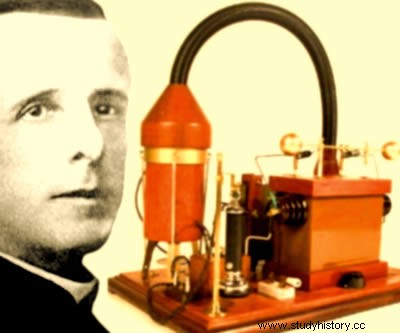
In the 19th century, the development and spread of Second Industrial Revolution already showed the man that time is money . Perhaps for this reason, this time was not only marked by the invention of new manufacturing machines, but also by several other inventions that shortened the sending of information and dynamized the completion of commercial transactions . That's where the media gained importance in the expansion of capital.
It was at this exact time that several scholars were investigating a way to improve communication tools combining the use of the electric telegraph , the electromagnetic radiation and the wired phone . The combination of these three technologies would be largely responsible for the invention of radio , which was patented in 1901 by the Italian physicist Guillermo Marconi . Given the importance of the feat, this scientist ended up being awarded the Nobel Prize in Physics .
Contrary to this official record, we have a group of gaucho enthusiasts who attribute the invention of radio to a Catholic priest named Roberto Landell de Moura . According to reports, on June 3, 1900, this priest brought together figures from the press, politicians and other personalities to demonstrate his invention in the middle of Avenida Paulista . Without using wires, the priest was able to transmit the human voice and telegraphic signals at the incredible distance of eight kilometers .
As a resident of a country still essentially agrarian, Landell ended up not getting the projection and sponsorship necessary to commercially manufacture his invention. Disheartened by the result of his intellectual effort, he ended up going to the United States in order to patent their inventions that transmit information and voice. In October 1902, the American newspaper “The New York Herald” spoke of his inventions and conducted an interview with the Brazilian cleric.
In Landell's testimony, we can see the difficulties he faced at the time to proceed with his research. In addition to stressing that his intention was to show that the Church was not the enemy of science, Landell de Moura made a point of reporting that, while he was in Brazil, he was persecuted by people who believed he had some kind of diabolic pact . The chase reached the point where a bunch of fanatics invaded their facility and destroyed their work tools.
In recent years, books on the priest's life and internet campaigns have sought ways to publicize Landell de Moura's importance to Brazilian science and correct the historical error concerning the discovery of radio. Regardless of the outcome of this “historical crusade”, we can see that the story of this ingenious priest shows us the limitations of a time when technology and education were concerns relegated to oblivion.
